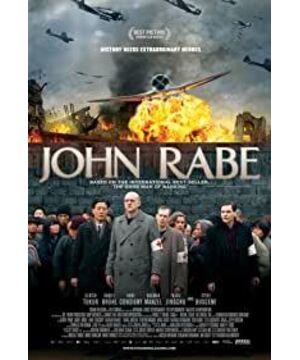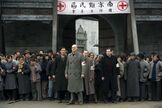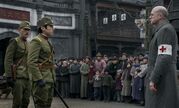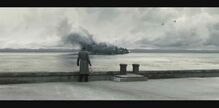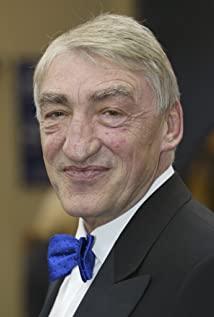But in private, the German people probably think that it is inappropriate to simply associate the image of a rescuer with the Nazis, especially as a means of propaganda with a "certain meaning", even more unpleasant. The original work of "Rabe’s Diary" is trivial, messy and simple. I read it a few years ago, and my impression now is also scattered: in fact, the connection between the Siemens engineer and the Nazi party is really not close. Nanjing has stayed for too long. (It seems that my impression here is not very sure, to be tested.) It is the Nazi party that joined in China. What happened in the motherland was only understood after returning to the country after the Nanjing incident (it’s like It was Günter Grass who admitted his SS status, saying that it was a kind of "consciousness" at the time: Of course, some people said that this old man was speculating on the sales of the "Peel the Onion")-his Whether deeds should be too much tied to the Nazi concept itself is a matter for the time being. However, I was impressed by the fact that in the diary, Rabe repeatedly used his status as a Nazi party member to retreat the Japanese soldiers who had entered his residence to harass the Chinese civilians he sheltered. A Nazi party flag can be used as a signal to charge and kill when it is raised, and it turns into a striking black red cross when it is lowered. I guess some of the Nanjing citizens rescued by Rabe at that time might have mistaken swastika for swastika, and regard this foreign uncle who speaks a dialect that everyone does not understand as a living bodhisattva who saves suffering in troubled times.
The various human natures that radiated from Nanjing at the end of 1937 and early 1938 should be more rational than just staring at the figure of 300,000: Lu Chuan and FG know this, which is considered as a filmmaker's self-consciousness. However, the methods of the two are different, and the evaluations they have gained in their respective countries are also different. Lu Chuan prefers to describe events, and the role is just his brush. In many existing comments, it can be found that the scene of tens of thousands of people "waiting for death" has stung many compatriots. After watching, I have to criticize or sigh for the negativity that overwhelms humanity. Mirror mentality. Whether this is good or not, of course everyone’s eyes will not be conclusive, but I guess that when collecting the data, Director Lu has probably seen a piece titled "Nanjing Entering the City, Fruits and Tobacco's Distribution を受け、喜んでThe Japanese Army’s Ten Thousand Years is called Nanjing Refugees ( http://commons.wikimedia.org/wiki/File:Cheers_for_Japanese_forces.jpg, Reposted from Wiki, please cross the wall if you can’t see it)” (this is a reasonable guess for a director who has filmed a documentary film with the theme of protecting Tibetan antelopes): A little favor is enough Let the Chinese civilians hold the devil officer and shout long live, which reminds people of Lu Xun’s painful mood when he watched the movie about the beheading of the national onlookers in Sendai-the key to restoring the current state of mind, "Nanjing! Nanjing!" should be. It did. FG is more inclined to express characters, his focus is on the topic, is "artistic restoration (following the thinking of the German media)" a real Rabe. Although this film won an award, but this point is It’s still a bit difficult, because the Germans who have been accustomed to being sensitive for 50 years have a hard time figuring it out—in fact, this film can be ignored by the Nazis, and Nanjing can also be ignored. This is just an ordinary German businessman doing it. I think I should do nothing more: and this is the most appropriate footnote written by the so-called humanitarian spirit in terms of examples.
Rabe’s wife, Dora, does not think how much her husband’s behavior in Nanjing is worth boasting, especially in Mr. Rabe After being used as a symbol of some ulterior motives, she took the media to say such an intriguing remark: "Tolstoy has a diary that reads like this: Children sometimes give bread, sugar and money to others, thinking This is doing good, so complacent. Children don't know how these things come from, but adults should know that giving away other people's things is not "doing good." "There are several layers of the charm of this passage, so I think it is wise, but analyzing this passage in detail in this article does not seem to fit the subject (this may be an excuse, after all, it is not good to have too much divergence. ps this It seems that Solzhenitsyn has also quoted it in his autobiography, but the intention is different)-thinking that "children" refers to "Rabe", "government" or "media" can lead to a lot of discussion and Textual research shows that the inconclusive conclusion about Rabe’s problem in Germany can be seen from this example.
Interestingly, the young talented director FG has been in China for two years, and the media has some recognition of him, and deliberately moved his award-winning "Schatten der Zeit" and "Ich will sein" out for his own commentary, and Deliberately emphasized the "big difference" between "John Rabe" and "John Rabe". It seems that FG has been in Red China for two years, Rabe did not shoot well, instead he became the second "Rabe". Nothing, as mentioned earlier, FG is a member of Mensa and Rabe is a "good Nazi"; swastika is the emblem of the Third Reich, and the swastika wheel is pronounced "de" by Xuanzang... Nazis and Buddha, evil and good , Germany and China, Guizi and Nanjing, all of these arguments, generous statements, awe-inspiring justice, historical originality, artistic transformation, etc., are nothing more than controversies over 2d screens, speaker sounds, and hand-typed words. When will the devil come again and give readers who read these words a gun during the siege, do you dare to stand forward? What were you thinking at that time?
Please don't use this question to ask me back, I have never experienced that scene, and use romantic assumptions to build moral heights, a certain article can't do it^^
View more about John Rabe reviews


